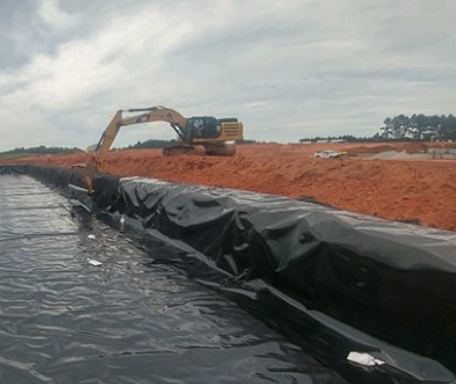- Understanding the Role of Geomembrane Liners in Waste Management
- Innovations in Geomembrane Liners for Water Management
- Geomembrane Liners: A Comprehensive Guide
- The Future of Geomembrane Liners in Civil Engineering
- Geomembrane Liners: Enhancing Landfill Stability
Manager:
WhatsApp:+86 177 0135 2670
Tel:+86 177 0135 2670
Email:marketing@okorder.com
Address:3rd Floor, No.2 Building, No.1 Sanlihe Road
What are the three types of geomembranes?
Geomembranes are essential materials used in diverse engineering and environmental applications to control fluid migration in man-made structures. They comprise impervious synthetic membranes made of polymers, which can withstand harsh environments. Composite geomembranes and high-density polyethylene (HDPE) geomembranes are two common types among the many varieties of geosynthetic liners available. These will be examined along with a third type to demonstrate the diversity that exists among geomembrane options.

1. Composite Geomembrane: A Blend of Strength and Flexibility
The name composite geomembrane implies that these products have been purposely engineered to improve performance by combining several materials. Usually, this blending involves using a geotextile, a geomembrane or other fill material as part of the component materials for creating a product possessing aggregated strength due to synergistic interrelationships between components in order to effectively address specific project requirements.
Structure and Composition
Generally, composite geomembranes consist of two primary layers: one layer made of Geotextiles and another layer made of a geomembrane. It acts as an impermeable barrier against fluid flow while providing reinforcement against punctures or mechanical damage.
The common materials used for making the primary barrier, such as HDPE, LDPE, LLDPE or PVC provide excellent chemical resistance and durability while non-woven or woven synthetic fibers make up most geotextile layers to provide for reinforcement and filtration properties respectively.
Applications
Composite Geomembranes are applied in several areas like:
1. Landfill Liners: Their function is to prevent leachate from polluting surrounding soil as well as ground water in landfills.
2. Pond & Reservoir Liners: Ensure zero seepage within ponds, reservoirs or any water containment structures by creating impenetrable barriers thereby enabling water retention.
3. Mining & Environmental Containment: They are used as barriers to prevent hazardous materials from spreading during mining and environmental remediation projects.
4. Secondary Containment: To avoid spills and leaks that may reach to the environment, they serve as secondary containment systems in industrial settings.
Advantages of Composite Geomembranes
- The combination of these layers increases their strength and makes them resistant to puncture
- Improved filtration ability and drainage capacity is given by the geotextile layer
- It can be utilized for a broad spectrum of project requirements.
- Watertight containment of water, chemicals, waste materials etc.
2. High-Density Polyethylene (HDPE) Geomembrane: The Robust Barrier
When one considers civil or environmental engineering projects, HDPE has been ranked as among the most commonly used geomembrane types in almost all applications. They are manufactured from high-density polyethylene resin which has an exceptional-strength, durability and chemical resistance characteristics to make it suitable for any demanding service.
Structure and Composition
In creating continuous sheets with different thicknesses through melting polyethylene resin known as extrusion process hdpe Geomembranes are produced in extrusion process. These sheet are then assembled on site by welding so that a seamless barrier is formed.
Applications
The various uses that HDPE geomembranes have include:
1. Waterproofing & Seepage Control: They help in preventing seepage into dam walls, reservoirs and canals during construction processes.
2. Aquaculture: Fish ponds liners made of HDPE geomembranes keep water levels stable besides preventing pollution.
3. Mining & Oil & Gas: This material line mining operations and oil & gas extraction sites for purposes of containing wastewater, chemicals among other byproducts.
4. Geomembrane Liners: They are used as liners for hazardous waste landfills, chemical storage facilities or other industrial lagoons holding toxic wastes etc.
Advantages of HDPE Geomembranes
High tensile strength and puncture resistance, ensuring long-term performance.
The material has a high tensile strength and is also resistant to puncture.
Excellent chemical resistance to a wide range of substances, including acids, bases, and hydrocarbons.
It exhibits excellent chemical resistance and can react with several other chemicals such as acids, alkalis and hydrocarbons.
UV resistance, allowing for exposed installations without degradation.
They are UV resistant thereby allowing their exposure in installations that are open or unprotected.
Ease of installation and welding, reducing labor costs and construction time.
They are easy to install thus cuts down on the expenses on labour as well time of construction since they can be welded easily.
3. The Third Type of Geomembrane: Polyvinyl Chloride (PVC)
Polyvinyl chloride geomembranes (PVC) are an important type in the market next to composite geomembranes and HDPE geomembranes because they have unique properties that make them suitable for specific applications.
Structure and Composition
This type of geomembrane is made from polyvinyl chloride resin combined with plasticizers and stabilizers among other additives; it is also used in manufacturing flexible sheets through calendaring or extrusion process which comes up with sheets having different thicknesses.
Applications
These membranes find use:
1. Waterproofing: pvc geomembranes protect against water penetration in buildings’ roofing systems, tunnels underground facilities etc.,
For instance,
2. Decorative Ponds and Lakes: To landscape designers building recreational areas containing artificial lakes and ponds it is known that PVC geomembranes are used in this case.
3. Waste Containment: These include containment facilities for waste such as municipal solid waste landfills, hazardous waste storage areas among others,
Advantages of PVC Geomembranes
- Flexibility and conformability to irregular surfaces, enhancing installation versatility.
- Conformability to irregular surfaces, promotes quick and easy installation.
- Resistance to chemicals, including acids, alkalis, and oils, ensuring long-term durability.
- It can withstand the action of chemical substances like acid, alkali or oil thus sustaining it over a long time.
- UV resistance when formulated with appropriate additives, suitable for exposed applications.
- They are also made with special additives which will not decompose when they come in contact with sunlight.
- Cost-effectiveness compared to other geomembrane materials, making them a preferred choice for certain projects.
- In fact they are far less expensive than most other types of geosynthetic materials hence the choice for particular undertakings lies towards them.

Conclusion
These geomembranes have been proven to have high tensile strength as well as puncture resistance which ensures their usefulness over an extended period of time.
Composite geomembranes, HDPE geomembranes and PVC geomembranes all offer unique advantages and applications that suit different project needs. This is because their uses vary from preventing fluid migration in landfills to containing hazardous materials in industrial facilities or waterproofing underground structures therefore ensuring that the infrastructure projects’ long term sustainability and integrity are guaranteed.”
Whether it’s keeping liquid waste out of landfill sites; or isolating toxic substances within industrial plants; or even waterproofing tunnels beneath our feet – all these require the right kind of liner."
- Previous:What is the difference between geotextile and geomembrane?
- Next:What is a geomembrane used for?
-
2024-06-13Geomembrane is not plastic cloth






